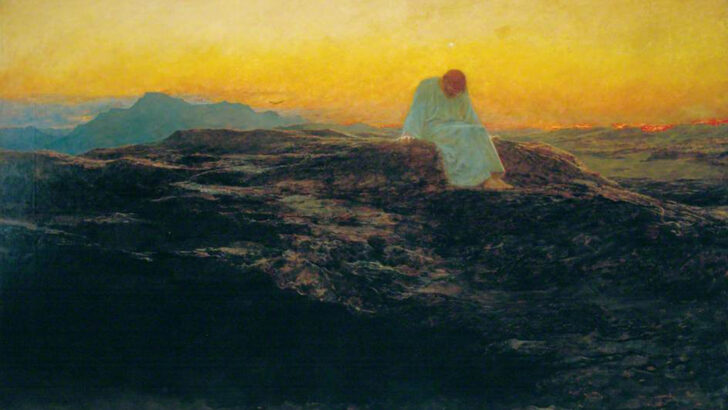Deacon Greg Kandra
Gn 9:8-15
Ps 25:4-5, 6-7, 8-9
1 Pt 3:18-22
Mk 1:12-15
Was that it?
This weekend, the first Sunday of Lent, we hear Mark’s account of Jesus going into the desert before he begins his earthly ministry. But Mark doesn’t tell us very much. He mentions Satan and angels, temptations and wild beasts. But that’s about it. It almost feels anticlimactic.
Interplay
Unlike the description of this event in the gospels of Luke and Matthew, Mark leaves out a lot – there’s no dialogue, no dramatic interplay between good and evil. Here, it’s one short paragraph in the life of Christ – just two sentences, almost finished before it’s even begun. How come?
You almost get the sense that Mark knew he had a bigger story to tell, and he wanted to get to it, so that Jesus could quickly set to work proclaiming his message: “The kingdom of God is at hand. Repent and believe in the Gospel.”
The 40 days living amid sand and stones were, in Mark’s telling, a brief prelude – a preparation for something more.
And that may be the point.
As we embark on our own time in the desert of Lent, with fasting and almsgiving and prayer, maybe there is a quiet but insistent message here for all of us.
The desert is an important part of the journey. But there is much more to come.
Mystery
Our own days in the Lenten desert are intended to draw us closer to the mystery of God’s love for humanity – the sacrifice and suffering he experienced for our sake – and to make us pray more deeply, give more generously, live more intentionally and humbly. It is nothing less than a time to experience more deeply our ongoing conversion as Catholic Christians.
So, we do without in order to reflect on what we need to do with.
What can we do with the time we have been given?
What can we do with the blessings in our lives?
What can we do with our hearts, our talents, our resources?
As Scripture reminds us at the very beginning of this time: the kingdom of God is at hand. What are we going to do about it?
Christ’s first command in this gospel passage should sound familiar; a lot of us hear it on Ash Wednesday, as our heads are bowed and our brows are marked. It was also the cry of John the Baptist on the banks of the Jordan. “Repent!”
Repent
It’s a word to awaken our hearts and stir our consciences. Repent! These days should challenge us to ask how we can do that, and how we can do it better.
These are days we need to use constructively, to reconnect with the very heart of the Gospel and to rediscover the two great commandments – loving God and loving our neighbour. We give up, so we can give. Among other things, we come to rediscover the poverty in our own lives and souls and seek to alleviate the poverty in the lives of others.
In Mark’s gospel, the desert is more than a destination, or a block of time on the calendar. And the same could be said of Lent. It is an opportunity to plan for the next part of the journey. It is where we seek to reform our lives and reshape our priorities in the prayerful hope that when we leave the parched landscape we will be stronger, healthier, holier – ready to embrace and celebrate the blessing of Easter.
This Sunday, we notice what Mark doesn’t say. But there’s a reason for that. Jesus had work to do.
And, it turns out, so do we.
Deacon Greg Kandra is an award-winning author and journalist, and creator of the blog, ‘The Deacon’s Bench’.


 Photo: The Temptation in the Wilderness, by Briton Riviere
Photo: The Temptation in the Wilderness, by Briton Riviere 